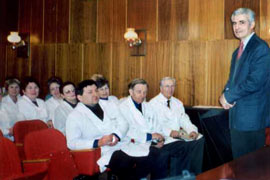Smoking-Cessation Program Motivates Russian Physicians to Assist Their Patients – and Themselves

The smoking prevalence in Russia is one of the highest in the world: 63 percent of men and 12 percent of women in the country currently smoke, with more than 30 percent of total male deaths and 5 percent of total female deaths attributed to the habit. Even more surprising is that the smoking prevalence and corresponding death rates among Russian health professionals equal that of the general population.
All told, 40 million Russians light up, and the numbers are increasing everyday. More than half of the current smokers say they want to kick the habit. But no national anti-smoking campaigns or programs are in force, and Russia did not sign the international Framework Convention on Tobacco Control.
Health professionals may be the solution to Russia’s smoking woes. Professionally respected and popularly revered, they could use such clout to change current smoking trends and spearhead a national anti-smoking movement. That is, if they weren’t committed to the same smoking behaviors, misperceptions and lack of motivation as their tobacco-using patients!
A Comprehensive, Critical Program
Currently, Russian physicians are one of the main barriers to tobacco control in the country. To address, and ultimately reverse, this situation, CECHE and the Russian Cancer Research Center took on the critical task of educating, motivating and training Russian physicians to champion smoking cessation. Partnering with the Moscow Health Education Center and the Russian Public Health Association, in 2003-2004, the organizations designed and implemented a comprehensive 18-month program to expand the number of knowledgeable, skilled tobacco-control clinicians in the country. The program includes the development, implementation and dissemination of: a cross-sectional survey of 1,000 physicians in 15 Moscow clinics; a series of 1.5-hour seminars in smoking-cessation counseling; a one-day course on tobacco-related health problems, tobacco-control measures and methods of tobacco-dependence treatment; and a science-based, practical manual for physicians.
Preliminary survey and program data revealed that, while 66 percent of male doctors, 21 percent of female doctors and 34 percent of nurses are current or former smokers, only 42 percent of smoking health professionals want to quit (as opposed to 60 to 70 percent of current smokers in the general population). Sadly, a majority of surveyed health professionals cannot name specific health hazards associated with smoking. And more disappointing, only 34 percent of them said that they would like to participate in a workshop on tobacco and health problems, and methods of tobacco dependence treatment.
Nevertheless, resolve is strong. Prodded by clinic chiefs and official invitations from the Moscow Public Health Department, a total of 1,000 health professionals have participated in 30 educational sessions conducted in 23 outpatient clinics and 7 hospitals in and around Moscow to date. Five one-day training workshops have also taken place, involving 200 physicians in Moscow, its surrounds and Nyzney Novgorod. In addition, the physician-targeted manual, "Smoking Cessation Assistance for Your Patients" is currently being published.
Eight workshops are already on the books throughout Russia for next year. Follow-up with physicians who attended workshops is also planned to evaluate the effect of the training on participant knowledge and smoking-cessation counseling activity.
Future program elements include: free nicotine-replacement therapy (NRT) for health professionals to secure their smoke-free status and to make them more active smoking cessation counselors and NRT advocates; and a "Tobacco or Health" educational training course for post-graduate students of medical high schools.
A Step in the Right Direction
The jury is still out, but patient referrals appear to be rising. Before project initiation, health professionals directed only 1 percent of smokers to smoking-cessation clinics; today that number has climbed to 20 percent.
The ultimate goal of the project is a drop in smoking prevalence and a corresponding rise in health benefits and life span among both Russian health professionals and the general population. As Russians queue to quit, the partners plan to expand the program to other regions of the Russian Federation - and are currently in discussion to conduct workshops in Samara, Novgorod and Shatura.
Vladimir Levshin, M.D., D.Sc.
Russian Cancer Research Center, Moscow
E-mail: lev@crc.umos.ru